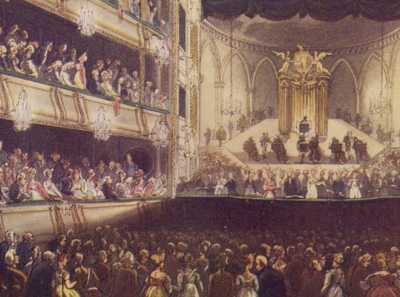For all of its influence, the Regency period in Britain only technically lasted nine years, from 1811 to 1820, when King George III was declared unfit and his heir ruled by proxy as Prince Regent. But the man who became George IV exerted his influence for many more decades after his death in 1830, and his interest in theatre and the arts characterized the period. This is the era of an astonishing proliferation of new theatres, catering to a wider audience than ever before. New forms of entertainment appeared (equestrian, military, melodramatic), and theatrical amusements grew more diverse as managers, authors, and performers dealt with changes in contemporary taste and preoccupations, an increased awareness of social issues, and technological innovations, among other developments.
To reflect the interdisciplinary nature and commercial motivations of theatre in the Regency Era, the conference invites papers by scholars exploring the period’s dance, music and drama from a range of historical and methodological perspectives.
Topics might include:
- composers, performers, playwrights, choreographers
- theatre reform, riots and protest
- illegitimate theatres, fairground theatres, minor theatres, the pleasure gardens, the early circus
- theatre architecture, lighting, machinery, scenic design, sound
- gesture, acting
- colonial theatres and theatres outside of London, transatlantic theatre and continental adaptations
- impact of railways and touring, traveling players
- economics, management
- oratorios, theatrical music concerts, theatre orchestras
- pantomime, panoramas, military spectacles, equestrian theatre
- listening and spectatorship
- critics, criticism, reception
- melodrama and the gothic
- gender and identity on the stage
- early minstrelsy and vaudeville
- Romanticism, nature and the sublime, realism and the supernatural
- Napoleonic Wars (and the Peace Celebrations in the theatre)
- children on the stage
- Austen, Byron, Lamb and the theatre
- theatrical taste and the social divide
- national identity, theatre and immigration
- theatre parties and balls
- theatre and liberty, social and political reforms.
Location
The conference will be held on the beautiful grounds of Downing College, Cambridge, and in its traditional nineteenth-century neo-classical rooms and Georgian-inspired theatre auditorium, dating from 2010. The fully-restored College was designed in 1806 by William Wilkins the Younger, the architect who designed the National Gallery and the Theatre Royal Bury St Edmonds, among other significant buildings. For further information on the venue and the accommodation please click here.
